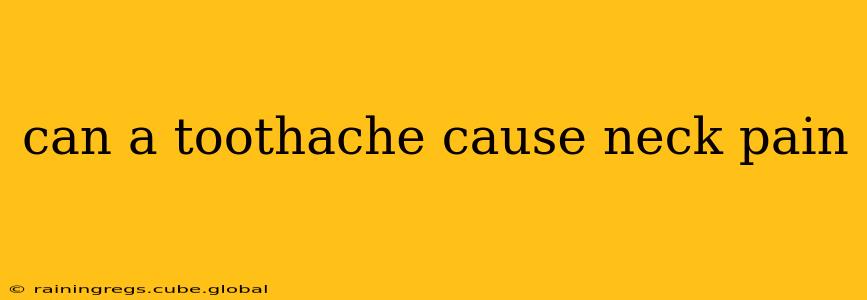A throbbing toothache is miserable enough on its own, but could it also be the culprit behind your neck pain? The answer is a resounding yes, although the connection might not be immediately obvious. While seemingly unrelated, your teeth, jaw, and neck are intricately connected through a complex network of muscles, nerves, and ligaments. Understanding this relationship is key to properly diagnosing and treating both the toothache and any associated neck pain.
How are Toothaches and Neck Pain Connected?
The connection between a toothache and neck pain often stems from the muscles and nerves in your head and neck. When you experience a toothache, you may unconsciously tense up the muscles in your jaw, neck, and shoulders. This prolonged tension can lead to muscle spasms, inflammation, and ultimately, neck pain.
Think of it like this: Your jaw is a hinge. If that hinge is constantly stressed due to a painful tooth, the surrounding structures—including your neck—will feel the strain. This is especially true if the toothache is severe or long-lasting.
Furthermore, the trigeminal nerve, a major nerve responsible for sensation in the face, including teeth, also branches into the neck. Pain signals from an inflamed tooth can be misinterpreted by the brain as originating from the neck, leading to referred pain. This means you feel pain in one area (your neck) when the actual source is elsewhere (your tooth).
What are the Symptoms?
The symptoms experienced can vary depending on the severity of the toothache and the individual's sensitivity. However, some common indicators that a toothache might be causing your neck pain include:
- Jaw pain: Pain or stiffness in the jaw joint (temporomandibular joint or TMJ) is a common companion to toothaches and can easily radiate into the neck.
- Headache: Often, a toothache can trigger headaches, and these headaches can contribute to or worsen neck pain.
- Limited range of motion in the neck: You may find it difficult to turn your head or tilt it in certain directions due to muscle tightness or pain.
- Shoulder pain: Tension in the neck muscles can easily spread to the shoulders, resulting in accompanying shoulder pain.
- Pain that worsens with chewing or clenching: This is a strong indicator that the pain's origin is related to your jaw and teeth.
Can a Tooth Infection Cause Neck Pain?
Yes, absolutely. A severe tooth infection, known as an abscess, can cause significant inflammation and swelling. This infection can spread to surrounding tissues, impacting the muscles and nerves in the neck and leading to significant neck pain. This is a serious medical condition that requires immediate professional attention.
How to Tell if it's a Toothache Causing Your Neck Pain:
Differentiating between toothache-related neck pain and other causes requires careful consideration of your symptoms. If you experience neck pain alongside:
- Sensitivity to hot or cold temperatures in a specific tooth
- Swelling around the affected tooth
- Visible tooth decay or damage
It's highly likely your toothache is the root cause of your neck pain. However, always consult a dentist and/or doctor for accurate diagnosis and treatment.
When Should You See a Doctor or Dentist?
Don't hesitate to seek professional help if you experience:
- Severe or persistent neck pain alongside a toothache
- Signs of infection, such as fever or swelling
- Difficulty opening your mouth
- Numbness or tingling in your face or neck
Ignoring a persistent toothache and associated neck pain can lead to more significant health problems. Early diagnosis and treatment can prevent complications and alleviate discomfort.
How is it Treated?
Treatment will depend on the underlying cause of your toothache. This might include:
- Dental filling or crown: to repair damaged teeth
- Root canal: to treat infected tooth pulp
- Extraction: in severe cases where the tooth needs to be removed
- Antibiotics: to treat infection
- Pain relievers: over-the-counter or prescription medications for pain relief
- Muscle relaxants: to alleviate muscle tension in the neck
- Physical therapy: to help restore normal muscle function and flexibility.
Remember, self-treating can be risky. Always consult a dental professional to determine the proper diagnosis and treatment plan. They can accurately assess your condition and provide the necessary care to resolve both the toothache and associated neck pain.
